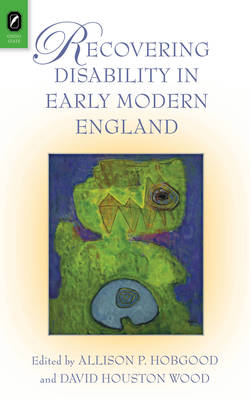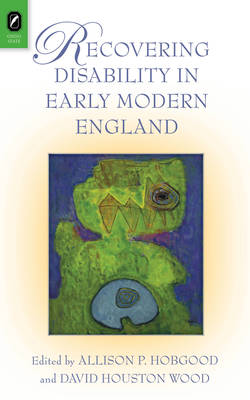
Door een staking bij bpost kan je online bestelling op dit moment iets langer onderweg zijn dan voorzien. Dringend iets nodig? Onze winkels ontvangen jou met open armen!
- Afhalen na 1 uur in een winkel met voorraad
- Gratis thuislevering in België vanaf € 30
- Ruim aanbod met 7 miljoen producten
Door een staking bij bpost kan je online bestelling op dit moment iets langer onderweg zijn dan voorzien. Dringend iets nodig? Onze winkels ontvangen jou met open armen!
- Afhalen na 1 uur in een winkel met voorraad
- Gratis thuislevering in België vanaf € 30
- Ruim aanbod met 7 miljoen producten
Zoeken
€ 33,45
+ 66 punten
Omschrijving
While early modern selfhood has been explored during the last two decades via a series of historical identity studies involving class, race and ethnicity, and gender and sexuality, until very recently there has been little engagement with disability and disabled selves in sixteenth- and seventeenth-century England. This omission is especially problematic insofar as representations of disabled bodies and minds serve as some of the signature features in English Renaissance texts. Recovering Disability in Early Modern England explores how recent conversations about difference in the period have either overlooked or misidentified disability representations. It also presents early modern disability studies as a new theoretical lens that can reanimate scholarly dialogue about human variation and early modern subjectivities even as it motivates more politically invested classroom pedagogies. The ten essays in this collection range across genre, scope, and time, including examinations of real-life court dwarfs and dwarf narrators in Edmund Spenser's poetry; disability in Aphra Behn's assessment of gender and femininity; disability humor, Renaissance jest books, and cultural ideas about difference; madness in revenge tragedies; Spenserian allegory and impairment; the materiality of literary blindness; feigned disability in Jonsonian drama; political appropriation of Richard III in the postcommunist Czech Republic; the Book of Common Prayeras textual accommodation for cognitive disability; and Thomas Hobbes's and John Locke's inherently ableist conceptions of freedom and political citizenship.
Specificaties
Betrokkenen
- Auteur(s):
- Uitgeverij:
Inhoud
- Aantal bladzijden:
- 234
- Taal:
- Engels
Eigenschappen
- Productcode (EAN):
- 9780814256435
- Verschijningsdatum:
- 9/10/2020
- Uitvoering:
- Paperback
- Formaat:
- Trade paperback (VS)
- Afmetingen:
- 152 mm x 229 mm
- Gewicht:
- 349 g

Alleen bij Standaard Boekhandel
+ 66 punten op je klantenkaart van Standaard Boekhandel
Beoordelingen
We publiceren alleen reviews die voldoen aan de voorwaarden voor reviews. Bekijk onze voorwaarden voor reviews.











